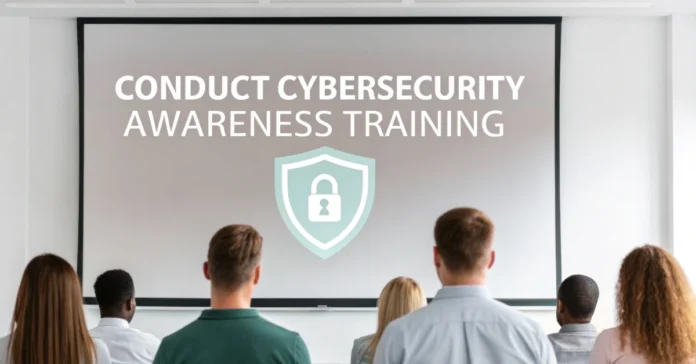Cyberattacks are no longer rare events. They’re now rampant and hitting businesses across the board. In 2024, the average cost of a data breach globally has climbed over USD$4.8 million. Unfortunately, that figure continues to grow with no sign of slowing down. (1)
As someone running a business, you know that a single attack can undo months of progress in a snap. That’s why cybersecurity awareness training can’t sit on the sidelines. It should be part of your company’s core strategy, not treated as an afterthought.
Here’s why this training deserves a spot in your priorities:
It Helps Prevent Costly Mistakes
As mentioned earlier, the financial fallout from a data breach can be massive. But it’s not always advanced attacks or complex hacking tools causing the damage. Based on a 2021 report, over 90% of security breaches are linked to human error. (2)
In many cases, the issue begins with small missteps like:
- Clicking on a suspicious email link
- Falling for a fake invoice or login prompt
- Sending credentials to the wrong person
- Using weak or repeated passwords
It’s not always about carelessness. People are busy, and even a brief lapse in attention can result in serious problems. One practical way to avoid slip-ups is to equip all your employees with basic security best practices.
Once these habits become routine, your team won’t waste time second-guessing shady links or strange emails. They’ll catch the warning signs early and know exactly what steps to take.
If you’re already juggling a lot, working with a managed IT provider can take some weight off your shoulders. They’ll handle the cybersecurity awareness program, so you can stay focused on running your business. Just be sure to assess their expertise, track record, and how well they tailor their training to fit your team.
It Reduces Business Disruptions
A slow or sluggish network is usually a minor tech hiccup. Your storage may be full, or the internet just acting up. But if you’ve tried the usual fixes and nothing improves, there’s a chance something more serious is happening. It could be a cyberattack happening in the background.
These issues aren’t always loud or obvious. Sometimes, it starts with one strange glitch that spreads across systems. By then, it might be too late. Work gets delayed, data goes missing, and everyone scrambles to fix what’s broken.
If your team has basic knowledge about cyber threats, they’ll know when to raise the flag before things spiral out of control. You’ll notice that everyone stays alert and reacts quickly to stop the situation from getting worse.
It Safeguards the Company’s Digital Assets
Threat actors exist for one main reason: digital assets are worth money. It’s how they make a living. They go after customer data, financial records, and other valuable information because those are easy to sell or hold for ransom. They don’t always crash through your system in plain sight. Most of the time, they sneak in quietly, looking for gaps or unnoticed vulnerabilities. One wrong move is all it takes for them to slip through.
That’s why it’s important to train your team to spot the subtle signs of a system infiltration, such as:
- Pop-ups or error messages that seem out of place
- Unusual login activity, especially at odd hours
- Files disappearing or being renamed without explanation
When your staff understands how these attacks work, your digital assets become much safer. For stronger protection, it also helps to set up multi-factor authentication. This method requires users to go through another step during login.
Instead of just a password, they might need a one-time code or a fingerprint. Even if intruders break the first layer of defence, they won’t get far without that second piece of verification.
It Protects Against Legal and Compliance Risks

Both brick-and-mortar and online businesses are expected to follow strict rules for protecting confidential information. These legal requirements hold them accountable for how it’s collected, stored, and used.
With data creation hitting 180 zettabytes in 2025, the stakes have never been higher. Even a single leak can trigger hefty fines, surprise audits, or, worse, lawsuits. (3)
Now, you can avoid all that headache by making sure your team knows what to do. A well-planned cybersecurity awareness training can help your staff stay on top of privacy policies and data handling protocols.
Below are a few major compliance standards many businesses need to meet:
- General Data Protection Regulation (GDPR): This applies to any business that handles the personal data of EU residents. It focuses on privacy rights and requires clear data transparency.
- Health Insurance Portability and Accountability Act (HIPAA): This regulation covers healthcare providers and related services. It protects the confidentiality and security of patient health information.
- Payment Card Industry Data Security Standard (PCI-DSS): Any business that handles credit card payments needs to comply with PCI-DSS. The goal is to prevent fraud by securing cardholder data during transactions.
Prioritizing online threat awareness training minimizes the risk of infringements. It also demonstrates to your clients and partners that you are serious about protecting their data. This keeps your business away from trouble with the law and gains more trust.
Wrapping Up
Cybersecurity is a key part of every business, and everyone within the company must be included. Awareness training on a regular basis is one of the greatest methods of doing that.
If your people are aware of what to watch for and how to address threats, you minimize the potential for significant interruptions, loss of data, or expensive errors. That readiness enables you to establish a stronger, safer company.
References:
- “Cyber Crime & Security”, Source: https://www.statista.com/markets/424/topic/1065/cyber-crime-security/#overview
- “Why Human Error is #1 Cyber Security Threat to Businesses”, Source: https://thehackernews.com/2021/02/why-human-error-is-1-cyber-security.html
- “Data Security And Compliance: Lessons From Modern Storage Solutions”, Source: https://www.forbes.com/councils/forbesbusinesscouncil/2024/10/21/data-security-and-compliance-lessons-from-modern-storage-solutions/


